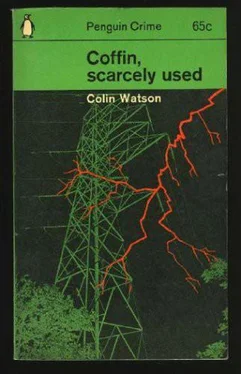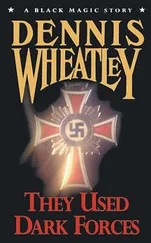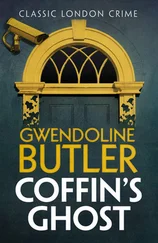“But he didn’t collect jealous husbands?”
“Not as you’d notice.”
“Did he have any other kind of enemies, do you know?”
Malley pursed his lips. “Well...put it this way. Nobody liked him. Does that help?”
“Enormously,” said Purbright. “I do like a big field.”
Love spoke. “But he had a circle of friends, surely?”
“Oh, yes,” said Malley. “Circle is the word.”
“Exclusive?”
“Like the reptile house.”
“Come now,” protested Purbright, “we must try to be objective about this. The list the wild-eyed housekeeper gave me was respectable enough. Wait a minute...” He took an envelope from his pocket. “Yes, there’s a doctor for a start. Hillyard—you know him?”
“Dipsomaniac,” retorted the unrepentant Malley.
“Medical Officer of Health-elect,” said Purbright, comfortingly. “Then there’s Bradlaw the burier. Blameless, surely. We’ve nothing on Nab Bradlaw, have we?”
Love shook his head. Malley grunted.
Again Purbright glanced at the list. “Rodney Gloss, man of law.”
“Straight as an acrobat’s intestines.” This from the stout sergeant.
Purbright sighed. “I think,” he said, “that we can start from the sound assumption that people seldom get themselves murdered by complete strangers. At the same time, we shall need to begin inquiring into what, if any, were Gwill’s departures from the normal and legitimate. Also, I propose to have a word with the Chief Constable and try and persuade him—God give me strength—that there is good reason to suspect that Gwill was done.
“And we needn’t hope to be spared trouble by old Chubb deciding to ‘call in the Yard’, as I believe the phrase goes. For one thing, he likes to keep misfortune in the family. For another, he’d probably be hesitant to bother such a busy man as Sir Robert Peel.”
Chapter Four
While Purbright was fortifying himself with food against the approaching ordeal by Chief Constable, Mr Harcourt Chubb, himself—a slow thinker and late eater—listened to a lawyer’s tale.
It was Mr Rodney Gloss who had called upon him.
The Chief Constable, silver-haired, composed and misleadingly aesthetic-looking, regarded his visitor with polite attention and a perpetual half-smile.
Gloss had put himself at a disadvantage by accepting a seat before he remembered that the Chief Constable habitually remained standing, even in his own drawing room. He was, therefore, obliged to crane a bull-like neck in order to keep Chubb in the focus of his little fierce eyes.
The solicitor spoke quietly and carefully.
“I need scarcely point out,” he began, “that what I am about to say is in the strictest confidence. It may be impossible of confirmation. I certainly wish, at this stage, to accept no personal part in the matter and to bear no responsibility for the veracity of anything I now mention.”
Mr Chubb nodded graciously. The solicitor turned further round in his chair and rested his folded arms along the back of it.
“You may be aware that I am—or was, rather—an acquaintance of Marcus Gwill, of whose shocking death I was apprised a short while ago. Indeed, he was my client. Naturally, I am unaware of the details of how he is supposed to have died, but I have heard the rumours that follow upon an incident of this kind. You will perhaps tell me if I am correct in believing the circumstances to have pointed to electrocution.”
Again Mr Chubb nodded.
“I see,” said Gloss. “My further information is that there were no witnesses of this unfortunate occurrence and that its nature is surmised on the strength of Marcus having been found beneath the electricity pylon opposite his house.”
“The police have no reason to suspect anything but an accident, if that is what you mean,” observed the Chief Constable. “A peculiar accident, certainly, but one that is not inconceivable.”
“Were I to say my conviction—my purely instinctive conviction, if you like—is that Gwill’s death was not accidental, would you be prepared to be guided by that without my providing evidence to support it?”
Chubb raised an eyebrow. “Might you explain what you have in mind, Mr Gloss?”
“That is just the point, my dear sir. The situation is such that I can give precious little explanation. I am, in a sense, a materialization of an anonymous letter writer. The anonymous letter, as we both know well, is given no less consideration by the police than a signed one, providing its contents promise to be useful. I could have gone to the rather absurd and distasteful length of pasting clipped-out words to a sheet of paper and sending you that, but I prefer to act straightforwardly and logically. In so doing, however, I think I am entitled to claim immunity from involvement.”
“Your duty, Mr Gloss, is to help the police in whatever way you can especially if you have reason to suspect a crime has been committed.”
“I am a solicitor, Mr Chubb, and well aware of what citizens are supposed to do. I am also aware of how seldom they do what they should, and of how little the police can do to make them. That is why I am here now instead of concocting a mysterious message from newspaper clippings. You and I are civilized, sophisticated and, let us admit it, privileged persons, who can afford to be advised by each other without going through all the wasteful, compromising nonsense of ‘official procedure’.”
Chubb paced slowly across the carpet and back. Standing before the fire, he regarded his fingernails thoughtfully. “I think you’re quite wrong, you know,” he said.
“In what respect?”
“In supposing Gwill to have been murdered. That is what you mean to imply, isn’t it?”
“It is.” Gloss looked at him steadily.
“But that’s absurd. The man wasn’t robbed. No one stuck a knife into him. He hadn’t run off with someone’s wife; I’d have heard soon enough at the club if he had. No, it’s not nice to say of a chap who always seemed absolutely sensible and level-headed, but it’s perfectly obvious that he must have gone off his chump all of a sudden in the night. You and I can see that, but there’ll be no need for the town to make a song and dance of it. The local paper can hardly do anything else but soft pedal. You know he owned it, I suppose?”
“Of course. I was his solicitor and I presume I shall continue to handle the legal affairs of the company. But we are straying a little from the point. The very fact that I stood in a professional relationship to Gwill surely should carry weight when I tell you that he was not without enemies.”
“Few of us are, Mr Gloss.”
“I might also add...” Gloss hesitated.
“Yes?”
“It should be understood, perhaps, that my motives for approaching you on this matter are not entirely altruistic. You see, I am not confident that my own safety is henceforth assured.”
Chubb blinked. “What do you mean?”
“Simply that I am extremely apprehensive. For what other reason do you suppose I might have come to see you? To put it absolutely baldly, I am asking you to provide—unobtrusively and unofficially—what I suppose we must call police protection.”
“But protection against what, man?” The slightest suggestion of fluster had crept into the Chief Constable’s voice.
“I cannot tell you. You will just have to trust me when I say that I have ample cause to be alarmed and to urge you to regard the death of Marcus Gwill as deliberately contrived—and perhaps the prelude to further crimes. Believe me, Mr Chubb, I have no desire to seem guilty of sensationalism, but when the alternative is to await in silence another curious accident of which I may be the victim, I am prepared to shed a little dignity.”
Читать дальше












